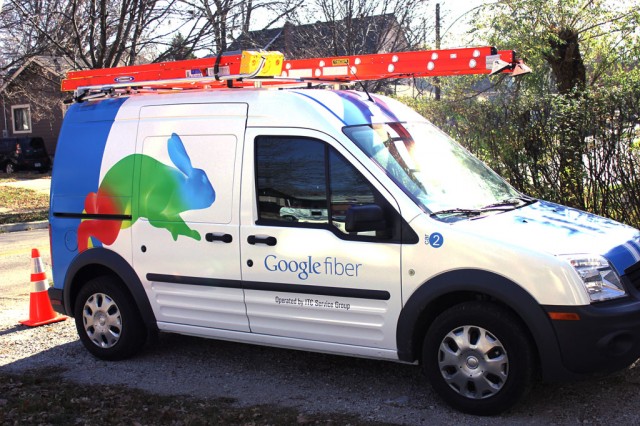
Just one day before Google is expected to announced that it will bring Google Fiber to Austin, Texas, two Wall Street analysts from Alliance Bernstein (Carlos Kirjner and Ram Parameswaran) have calculated that it would cost $11 billion annually to bring gigabit to the rest of the nation on the scale of other large nationwide providers like Comcast or Time Warner Cable. Based on that model, Google’s fiber network would pass “roughly 15 percent of US homes.”
By comparison, Google is worth (based on its market capitalization) around $253 billion—so the search giant would have to spend about four percent of its net worth (spread over five years) to bring a fair portion of us some of that sweet, cheap, crazy-fast broadband.
Google appears to be looking for cities that have a certain size (geographic area) and a certain population density—Austin's is roughly the same size as Kansas City, KS and Kansas City, MO combined. Google's aim, after all, is really to sell increasingly targeted ads—Fiber, like Gmail and search, is a means of doing that.
We remain skeptical that Google will find a scalable and economically feasible model to extend its build out to a large portion of the US, as costs would be substantial, regulatory and competitive barriers material, and in the end the effort would have limited impact on the global trajectory of the business.
For example, making the far from trivial assumption that Google can identify 20 million homes in relatively contiguous areas with (on average) similar characteristics as Kansas City when it comes to the most important drivers of network deployment cost, homes per mile of plant and the mix of aerial, buried and underground infrastructure, and that Google decides to build out a fiber network to serve them over a period of five years, we estimate the [total capital expenditure] investment required to be in the order of $11 billion to pass the homes, before acquiring or connecting a single customer.
As far as these financial analysts are concerned, it seems unlikely that we’re going to get some serious competition everywhere that Ars readers live, but we can dream, can’t we?
So why is Google undertaking this entire process?
Here's what the Bernstein folks say: "we believe Google Fiber has two related objectives: first, Google is seeking to figure out whether or not, or under what conditions, it can make money as a facilities-based provider of broadband and pay TV services; second, it is an opportunity for Google to test new applications, new ad formats and delivery models (e.g., targeted TV ads) and to get further insight into consumer behavior. We do not believe this effort will have any significant impact on regulation or legislation."
UPDATE 3:45pm CT: Kirjner wrote us to say that he had "picked up a typo in our write-up. The $11 billion is not annual but total. I corrected it in our files. Please do so too if you can." In other words, rather than Google spending $11 billion annually, the analysts estimate this is what Google would spend over five years.
reader comments
135